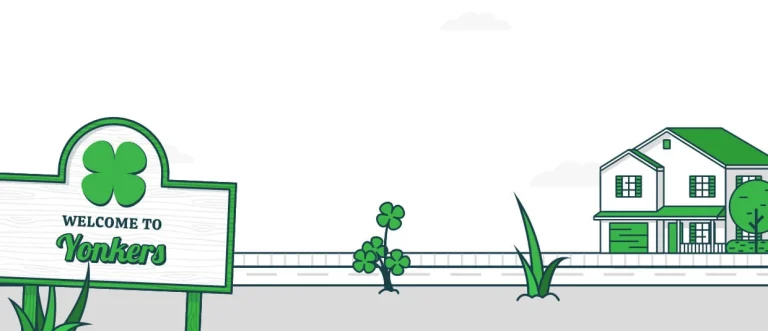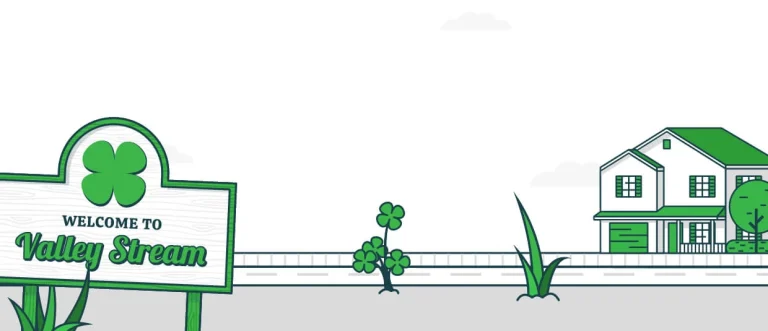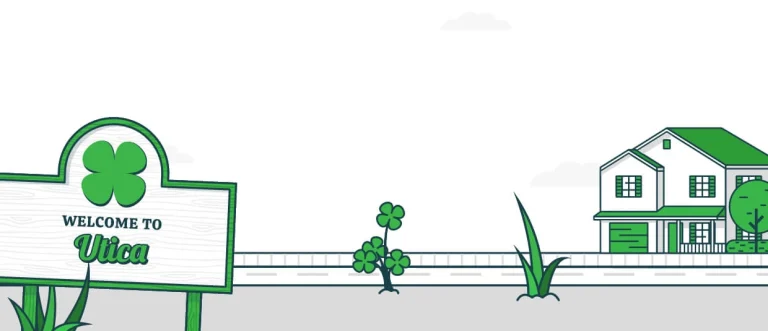Getting homeowners insurance is the best way to financially protect yourself and your family in case of unexpected tragedies of any scale — from thefts and accidents to natural disasters.
This guide below will help you determine what home insurance covers in Massachusetts, how much it costs, what affects rates, and more so you can make the right decision.
How Much Is Homeowners Insurance in Massachusetts?
The average cost of homeowners insurance in Massachusetts is about $1,476 annually, using an average dwelling value of about $272,000. This number is based on a combination of several top state carriers. While the following averages are still useful, know that your premium may vary when you get quotes due to several other factors, which we’ll also break down later.
When carriers are determining Massachusetts home insurance rates, one of the primary factors affecting premiums is how much coverage you need, which is based on your property’s value. Look below at average home insurance costs in Massachusetts based on coverage amounts.
| Dwelling Coverage | $200,000 | $300,000 | $400,000 |
|---|---|---|---|
| Annual Premium | $1,084 | $1,628 | $2,171 |
As you can see, homeowners insurance rates in Massachusetts climb as coverage amount climbs. Larger, more expensive properties to build need more insurance coverage, which costs more money – a principle called replacement cost.
In addition to home value, other personal and property-related details affect premiums. Before we delve into those, we want to highlight companies that are offering some of the cheapest home insurance in Massachusetts, on average.

It’s Time to Switch Your Homeowners Insurance
We partner with the nation’s top homeowners insurance companies so you can get a custom policy at an affordable price.
Companies With the Cheapest Homeowners Insurance in Massachusetts
Andover, Arbella, and MAPFRE offer cheap homeowners insurance in Massachusetts, according to our research. We analyzed the rates of some of the top carriers in the state at a few common coverage levels. The table below shows our findings.
| Company | $200,000 Coverage | $300,000 Coverage | $400,000 Coverage |
|---|---|---|---|
|
Amica |
$1,334 | $1,343 | $2,361 |
|
Andover |
$989 | $1,294 | $1,906 |
|
Arbella |
$896 | $1,199 | $1,662 |
|
MAPFRE |
$981 | $1,322 | $1,840 |
|
Travelers |
$1,201 | $1,413 | $1,922 |
Again, these numbers are just averages, and you may find different results when getting exact quotes frm Massachusetts homeowners insurance companies. Also, it’s important to note that the cheapest coverage isn’t always the best. You don’t always want to skimp on protection or sacrifice customer service or experience to save money.
Nevertheless, keeping costs low is always helpful, and no one wants to spend more than they have to on Massachusetts home insurance coverage. You must find a balance between quality care and affordable rates, which is why comparing quotes and shopping around is always a good move. You can also look for discounts, such as bundling the best home and auto insurance in Massachusetts.
Best Home Insurance Companies in Massachusetts
The best homeowners insurers in Massachusetts are the ones that satisfy all your coverage needs at a price that works. Since every person and provider is different, you must shop around to find the best policy. What may be the best provider for you may not be the best for someone else.
Usually, national providers will have the easiest ways to get homeowners insurance quotes online in Massachusetts. According to the National Association of Insurance Commissioners’ 2023 Property and Casualty Market Share Report, the largest homeowners insurance companies in Massachusetts by market share are:
- MAPFRE (12.2%)
- Liberty Mutual (9%)
- Safety Insurance (6%)
- Andover (6%)
- Travelers (6%)
Massachusetts is rather unique when it comes to its largest home insurers. Oftentimes, the biggest names are the national brands, such as State Farm and Allstate. However, three of the top five home insurers in Massachusetts are regional carriers that offer coverage primarily in the Northeast (Mapfre, Safety, and Andover).
The top two insurers in the Bay State are headquartered in the state. MAPFRE homeowners insurance is headquartered in Webster, while Liberty Mutual in Massachusetts is headquartered in Boston.
While not listed, USAA insurance in Massachusetts is also a popular option for people who have served or have family members who have served in the armed forces.
You’ll likely want to get quotes from several options to know who charges what and who has coverages you may want. You can also look at other aspects like company reviews and carrier financial stability ratings to get a complete picture of the best home insurance companies in Massachusetts.
What Does Homeowners Insurance in Massachusetts Cover?
Although the price of every Massachusetts homeowners insurance policy will vary, the standard coverages included in every plan typically say the same. They are as follows:
Coverage A: Dwelling — This covers the physical structure of your home and the components that make it, such as the roof, siding, windows, and floor. Since it protects the actual home itself, the amount of Coverage A on your policy should be the equivalent, or slightly more, than your home’s value.
Coverage B: Other Structures — Other structures are permanent fixtures and features on your property that are not attached to your house. These include fences, sheds, gazebos, detached garages, and more.
Coverage C: Personal Property — This is designed to protect the policyholder’s belongings within and around the home. Covered items include clothes, furniture, electronics, tools, and more. Some especially valuable things, like art and memorabilia, will have specific sub-limits.
Coverage D: Loss of Use — Loss of use helps pay for expenses if the policyholder’s home is uninhabitable after damage from a covered peril. Covered expenses under loss of use coverage include hotel stays, food, gas, and more.
Coverage E: Personal Liability — Personal liability coverage can cover bills and legal expenses for incidents on the policyholder’s property. Coverage extends to incidents like dog bites, major injuries and accidental deaths.
Coverage F: Medical Payments — Similar to personal liability, medical payments to others covers minor injuries on the policyholder’s property — whether or not they’re found liable for the incident.

It’s Time to Switch Your Homeowners Insurance
We partner with the nation’s top homeowners insurance companies so you can get a custom policy at an affordable price.
Getting the Best Homeowners Insurance in Massachusetts
The best homeowners insurance in Massachusetts will cover your home completely and comfortably. It should include Coverages A through F and may have even more, if necessary, depending on your home and location.
Property Coverages
For example, let’s say you have a $250,000 home. The best possible policy will have at least $250,000 of dwelling coverage, if not slightly more. Normally, a policy will cover your other structures for about 10% of your dwelling coverage, so you’d have at least $25,000 in other structures coverage in this scenario.
Measure that this is right for you based on the number of other structures you have. For example, detached garages or pools are likely the most costly other structures you can have on your property. If you don’t think your policy would pay to mostly or fully rebuild these after a disaster, bring it up with your provider.
Companies have different ways of calculating the recommended levels of personal property coverage you should have. You don’t need to go with their suggestion. Make sure you have enough to cover everything you own fully. If you don’t have a lot of things, you can lower it, so you’re not paying for coverage you don’t need. And, be wary of items with sub-limits. The best insurers will let you schedule high-value items like art, furs, and jewelry, in most cases.
Liability Coverages
Policies also typically come with at least $300,000 of liability coverage. You can increase your liability limits at little cost, so it’s always safer to air on the side of caution. If you have a large family, often host many visitors, or own a substantial amount of financial assets, you have even more reason to protect your finances and increase the liability coverage in your property insurance in Massachusetts.
Medical payments coverage is also easily adjustable. The cost difference between $3,00 and $5,000 limits, for instance, might be a few dollars per year, if anything at all. Additionally, loss of use coverage is typically between 10% to 30% of your dwelling limit. You may need to adjust this based on the cost of living in your area.
You should also stay on top of your policy, updating your dwelling coverage to reflect notable changes in home value. For instance, if you’ve done extensive renovations in the last year but haven’t changed your home insurance plan in several years, you’re probably underinsured since your policy won’t reflect your house as it currently stands. The best home insurance in Massachusetts will allow you to easily make changes to your policy and consult your provider or agent without question.
How a Home Insurance Agency in Massachusetts Can Help
If you have questions about finding, maintaining, or changing your Massachusetts house insurance, an insurance agency is the best place to turn. The right agent can relieve all of your insurance-related headaches.
There are two general types of Massachusetts insurance agents: captive and independent. A captive agent works with only one insurance provider. This is how State Farm sells many of its policies, for instance.
On the other hand, an independent insurance agent partners with several companies and can shop around for you to get quotes and coverage that best suits your needs. Our team at Clovered is full of licensed, independent agents that can help you find great rates.
Factors That Affect the Average Cost of Homeowners Insurance in Massachusetts
The average cost of homeowners insurance is influenced by several variables relating to your home’s risk level. Insurance companies are concerned about the potential of your property spawning a claim, which costs them money. Your premium reflects that risk of covering you accordingly.
A list of factors that affect the average homeowners insurance in Massachusetts and how they can affect your premium is below:
In Massachusetts, the Department of Insurance reports that the most filed claims are for water damage and wind damage. Insurers will look for properties that are susceptible to these issues. Insurers may take special notice of related components such as old or leaky pipes, worn siding, and, of course, location.
Location: Being in a flood zone, hurricane-prone area, or high-crime area can raise your premiums.
Home Age: Older homes tend to have more issues that can lead to claims, such as old roofs, faulty wiring, Outdated HVAC, plumbing, and electrical systems, and more. Older houses tend to have higher premiums.
Home Replacement Cost: We touched on this earlier, but the value of your house influences how much dwelling coverage you need. Insurers determine your home’s value by its replacement cost, which is how much it would cost to rebuild your home from scratch. This is why larger, more expensive homes generally have higher premiums than smaller, simple houses.
Home Features: Certain features that you can usually change influence your premiums. Having a wood stove, trampoline, or pool can raise your rates. Alternatively, having a home security system or deadbolt locks can lower your premiums.
Policy Deductible: You choose your deductible when you get a policy. Choosing a higher deductible can lower your premiums and vice versa.
Claims History: Insurance companies examine a property’s claims history and a potential policyholder’s claims history. Someone who files a lot of claims, or someone who lives at a place that generates a lot of claims, presents a bigger risk for providers. Carriers will charge this person higher rates as a result.
Homeowners Insurance for Coastal Risks in Massachusetts
Coastal properties in Massachusetts are especially susceptible to certain types of damage, such as flooding and wind damage. Although you might not think it initially, the state is vulnerable to hurricanes. Additionally, Massachusetts residents can expect nor’easters and winter storms that can bring tremendous winds and rain even after hurricane season, so properties are at some sort of risk year-round.
When one of these storms comes, coastal homes are most vulnerable to potential storm surges and direct impact from hurricane winds from the ocean. These can be devastating. As a result, insurance companies are especially watchful of properties on or near the coast, and they tend to have higher premiums.
Massachusetts Wind Deductibles
In Massachusetts, coastal properties often have a separate deductible for wind damage, called a wind or hurricane deductible. Unlike the all other perils (AOP) deductible, which is a fixed number such as $500 or $1,000, a wind deductible is usually a percentage of your dwelling coverage.
The Department of Insurance reports that all but four insurers in Massachusetts have mandatory wind deductibles. The most significant wind deductibles are in the coastal parts of Bristol, Plymouth, Barnstable, Dukes, and Nantucket counties. Wind deductibles are typically 2% to 5% of your dwelling coverage.
| Company | Maximum Wind Deductible Percentage |
|---|---|
|
American Family |
5% |
|
Amica |
5% |
|
Andover |
5% |
|
Arbella |
3% |
|
Chubb |
5% |
|
Mapfre |
5% |
|
Plymouth Rock |
2% |
|
Quincy Mutual |
5% |
|
Travelers |
5% |

It’s Time to Switch Your Homeowners Insurance
We partner with the nation’s top homeowners insurance companies so you can get a custom policy at an affordable price.
Massachusetts Homeowners Insurance Dog List for Breed Restrictions
Another factor to affect your insurance rates is your family pet, namely some dog breeds. Insurance companies are wary of breeds known to be aggressive and will raise your premiums or deny you coverage altogether if you own them in some cases. Sometimes, a provider may offer you a policy, but exclude liability coverage, which means you won’t be covered for dog bites.
High-risk dog breeds are:
- Pit bulls
- Rottweilers
- Wolf dogs
- Dobermans
- Chow Chows
- Mixes of these breeds
Different companies have different stances towards dogs, and acceptance will vary by provider. When getting quotes, most companies will ask if you have a dog. You must answer this question truthfully, as concealing your dog from your provider can result in canceling your policy or worse.
What to Know About Massachusetts Property Insurance Inspections
When getting a homeowners policy in Massachusetts, don’t be surprised if your carrier wants to inspect your property. Insurers require inspections of many homes to gauge risk accurately and verify information in your paperwork.
Insurance companies use property records, claims history, and more to check the information you tell them about your house. Sometimes, they need additional information to fill in gaps, especially if you haven’t had an inspection done in a long time, you’ve made renovations, or you’re switching carriers. When needed, insurers send one of their inspectors.
The extent of an inspection will vary per house. The inspector may just need to walk or drive around the exterior in newer homes. But, sometimes, they’ll need to come inside to check for worry signs, like ventilation issues that could exacerbate fire or freezing issues, mold, or other clear signs of disrepair, neglect, or wear and tear.
An inspection can take anywhere from a few minutes to a couple of hours. Bigger, older homes may take longer to inspect. If an inspector spots a major red flag on your property during an inspection, they can cancel your new policy during the underwriting period.
Note that requirements may be stricter on mobile homes. Mobile home insurance in Massachusetts is technically fulfilled through an HO-7 policy, while traditional homes get coverage through a policy formally known as an HO-3 plan.
Is Homeowners Insurance Required in Massachusetts?
No, homeowners insurance isn’t required at the state level anywhere, including Massachusetts. But, mortgage lenders typically mandate that their lessors maintain coverage to protect their investment.
No law requires you to have Massachusetts property insurance, whether you’ve paid off your home or not. However, most people who own homes have mortgages. Mortgage lenders require coverage so they can recoup the value of your house from the insurance company if something happens to it.
If you drop coverage or stop paying for your policy, your lender can force place insurance on you. Force-placed insurance is less comprehensive and more expensive than normal policies, so try to avoid it. Your mortgage may refer to it as lender-placed hazard insurance in Massachusetts.
Lenders requiring coverage isn’t necessarily a bad thing. Most people would recommend maintaining house insurance in Massachusetts even if you’ve paid off your home, since homeowners insurance is the best way to financially protect yourself and your property. You don’t want to be without coverage in the worst-case scenarios.
Do You Need Flood Insurance in Massachusetts?
Flood insurance is always separate from your homeowners insurance coverage, and your lender may also require you to get Massachusetts flood insurance if your property is in a federally designated high-risk flood zone.
Home insurance doesn’t cover flood damage, which causes most people who need flood insurance to turn to the National Flood Insurance Program (NFIP), administered by the federal government through the Federal Emergency Management Agency (FEMA).
FEMA also handles the nation’s flood mapping and determines property flood risk for all properties. Federally backed mortgages and many private institutions will require you to get flood insurance in addition to home insurance if your house is located in a FEMA high-risk flooding area.

Stay Above Water With Flood Insurance
Do you want to pay for costly and common flood damage yourself or have an insurance policy pick up the tab?
Massachusetts Homeowners Insurance Laws to Know
House insurance companies in Massachusetts have certain rules and regulations they need to follow when offering coverage. They often pertain to how an insurer offers coverage and specific time limits to make decisions.
For instance, if a company decides to non-renew your policy, they generally have to provide written notice 45 days before the expiration date. If they choose to cancel your policy outright, they need to give you at least a five or 10-day notice and your mortgage lender a 20-day notice.
The underwriting period is the time right after your policy is activated when your insurer is finalizing your coverage and double-checking everything. Massachusetts homeowners insurance requirements state that an insurer can only cancel your policy outside the underwriting period, typically the first 30 or 60 days, for a small number of reasons, like if they found you submitted erroneous or false information. But, you can cancel your policy at any time for any reason.
In Massachusetts, you should also be aware of heating oil coverage, which is protection from fuel spills or mishaps related to oil heat systems. Most policies in the state don’t include this coverage automatically in plans, but providers are required to offer it optionally. You also should be notified of your wind deductible clearly.
How to Get Homeowners Insurance Quotes in Massachusetts
As we outline above, there’s a lot to keep in mind when getting home insurance quotes in Massachusetts. Thankfully, you can compare quotes from multiple providers easily with Clovered. It just takes minutes to input your information into our quoting platform and get a policy with one of our many partners.
If you have questions or need any help along the way, our team of licensed agents would love to assist you with your house insurance quotes in Massachusetts. We’re available by phone at 833-255-4117 during business hours, or you can email us at agent@clovered.com.
The editorial content on Clovered’s website is meant to be informational material and should not be considered legal advice.

 Average Cost of Homeowners Insurance in Massachusetts
Average Cost of Homeowners Insurance in Massachusetts 

